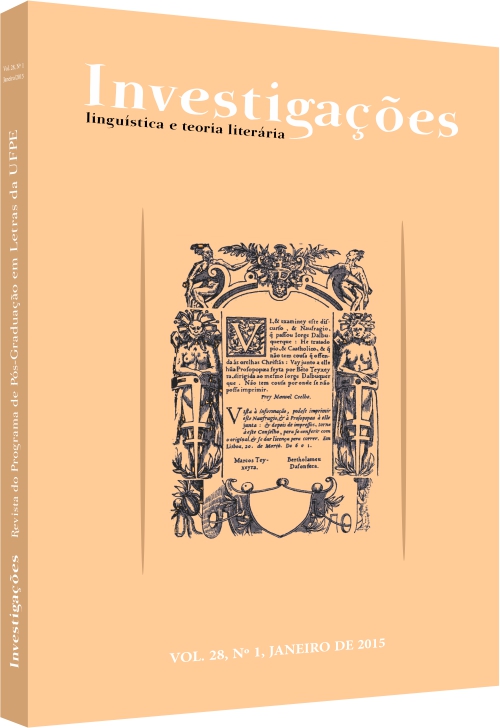Sombras Severas: Das lembranças traumáticas que (re) existem no romance Amada, de Toni Morrison
Abstract
Este estudo propõe - tendo como suporte o romance Amada, de Toni Morrison - uma reflexão sobre memória traumática e a força do testemunho sobre o sinistro, ora renunciado, ora (re)vivenciado, e suas implicações no trato com o passado/presente das personagens do romance em questão. Colaboram para as bases teóricas desta análise, escritos de Walter Benjamin, Márcio Seligmann-Silva, Primo Levi, Maurice Halbwachs e Joel Candau.
References
BENJAMIN Walter. Obras escolhidas. Vol. 1. Magia e técnica, arte e política. Ensaios sobre literatura e história da cultura. Prefácio de Jeanne Marie Gagnebin. São Paulo: Brasiliense, 1994.
BERGSON, Henri. Matéria e Memória: ensaio sobre a relação do corpo com o espírito. Tradução: Paulo Neves. 3ªed. São Paulo: Martins Fonte, 2006.
CARDOSO, M. R. O trauma psíquico e o paradoxo das narrativas impossíveis, mas necessárias. São Paulo: Escuta. Recebido em 29 de dezembro de 2007 Aceito para publicação em 14 de maio de 2008.
COUTINHO, Ângela. Estudos da Língua(gem) A especificidade da memória em psicanálise Vitória da Conquista v. 11, n. 1 p. 59-74 junho de 2013 Artigo Recebido em abril de 2013. Aprovado em maio de 2013.
HALBWACHS, Maurice. A Memória Coletiva. Editora revista dos tribunais Ltda., São Paulo, 1990.
CANDAU, Joel. Memória e Identidade. Tradução: Maria Letícia Ferreira. São Paulo: Contexto, 2011.
LEVI, P. É isto um homem. Rio de Janeiro: Rocco, 1988.
MORRISON, Toni. Amada. Tradução: José Rubens Siqueira. São Paulo: Companhia das Letras, 2007.
SELIGMANN-SILVA, M. A história como trauma. Em Nestrovsky, A. & Seligmann-Silva, M. (orgs.). Catástrofe e representação (p. 73-98). São Paulo: 2002
___________________. (2007). Narrar o trauma: a questão dos testemunhos de catástrofes históricas. Comunicação apresentada no Encontro Nacional Trauma e Memória, Rio de Janeiro/PUC-Rio, Junho de 2007.
Downloads
Published
How to Cite
Issue
Section
License
Copyright (c) 2015 Glauco Cunha Caze

This work is licensed under a Creative Commons Attribution 4.0 International License.
Authors who publish with Revista Investigações agree to the following terms:
Authors retain copyright and grant the journal right of first publication with the work simultaneously licensed under the Creative Commons Attribution 4.0 International (CC BY 4.0) license that allows others to share the work with an acknowledgement of the work's authorship and initial publication in this journal.
Authors are able to enter into separate, additional contractual arrangements for the non-exclusive distribution of the journal's published version of the work (e.g., post it to an institutional repository or publish it in a book), with an acknowledgement of its initial publication in this journal.
You are free to:
Share — copy and redistribute the material in any medium or format for any purpose, even commercially.
Adapt — remix, transform, and build upon the material for any purpose, even commercially.
The licensor cannot revoke these freedoms as long as you follow the license terms.
Under the following terms:
Attribution — You must give appropriate credit , provide a link to the license, and indicate if changes were made . You may do so in any reasonable manner, but not in any way that suggests the licensor endorses you or your use.
No additional restrictions — You may not apply legal terms or technological measures that legally restrict others from doing anything the license permits.

